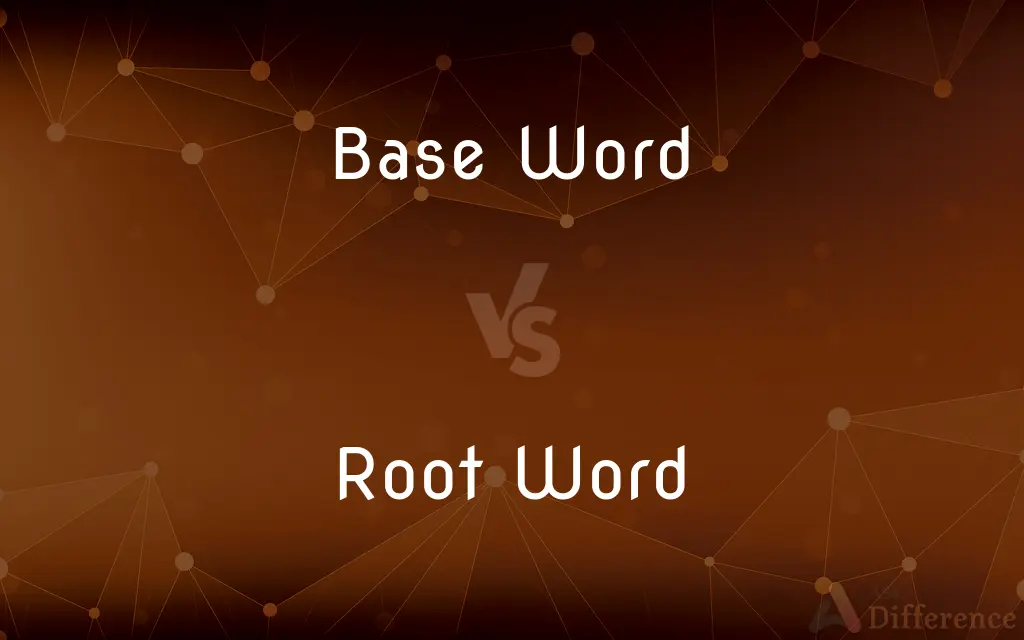Base Word vs. Root Word — What's the Difference?
Edited by Tayyaba Rehman — By Fiza Rafique — Published on November 8, 2023
A Base Word is a stand-alone word to which prefixes/suffixes can be added; a Root Word is the core part of a word, often from another language, providing primary meaning.

Difference Between Base Word and Root Word
Table of Contents
ADVERTISEMENT
Key Differences
The concept of a Base Word is tied to its function in English as a complete word that can stand alone and still convey meaning. On the other hand, a Root Word is the elemental part of the word, providing the primary sense, and often originates from ancient languages like Latin or Greek. Both the Base Word and the Root Word play integral roles in word formation, though their function and origin can vary.
When considering word derivations, a Base Word is often the starting point. For instance, the Base Word "play" can become "playing" or "played" with the addition of suffixes. In contrast, the Root Word offers the core meaning to the word, even if it doesn't stand alone. The Root Word "ject" (meaning "throw") can be found in "project" or "eject". Thus, while the Base Word can typically stand alone, the Root Word needs other components to form complete words.
By understanding both Base Word and Root Word concepts, one can grasp the anatomy of English words. Base Words are foundational; they are the building blocks which, when combined with affixes, can give birth to derived or compound words. Root Words, while they can't always stand alone in English, offer a fascinating glimpse into the etymological origins and historical development of the language.
Comparison Chart
Definition
A stand-alone word
The core part of a word providing primary meaning
Origin
English or adapted into English
Often from ancient languages (e.g., Latin, Greek)
ADVERTISEMENT
Standalone?
Can stand alone
Typically doesn't stand alone in English
Usage
Forms new words with prefixes/suffixes
Offers core meaning to words and seen in various derivations
Example
"Play" in "playing"
"Ject" in "eject"
Compare with Definitions
Base Word
A word that gives a basic meaning.
Help is the Base Word in helpful.
Root Word
A word segment conveying core meaning.
The Root Word tele means far, used in television.
Base Word
A primary word before prefixes or suffixes.
Care is the Base Word in careless.
Root Word
The elemental part offering primary word sense.
The Root Word therm means heat as in thermometer.
Base Word
A word from which other words evolve.
Run is the Base Word in runner.
Root Word
The fundamental part of a word giving primary meaning.
The Root Word struct means build as in construct.
Base Word
A standalone word forming the foundation for derivatives.
Friend is the Base Word in friendship.
Root Word
A base of a word that isn't always standalone.
The Root Word bio means life as in biology.
Base Word
A word that exists independently before modification.
Child is the Base Word in children.
Root Word
An origin word from ancient languages.
The Root Word graph means write, seen in autograph.
Common Curiosities
Can a word have both a Base Word and a Root Word?
Yes, for instance, in "unhappy", "happy" is the Base Word, and "hap" is the Root Word.
Are Root Words always from ancient languages?
Often, but not always. Many Root Words are from Latin or Greek.
Can a Base Word become a Root Word?
In etymology, as languages evolve, what was once a Base Word in one language might be a Root Word in another.
What's the primary function of a Root Word?
A Root Word provides the core meaning to a word.
Can a Base Word exist on its own?
Yes, a Base Word can stand alone and convey meaning.
Why is it useful to know Root Words?
Recognizing Root Words can help decode unfamiliar words by understanding their core meaning.
Is the Root Word always at the beginning of a word?
No, a Root Word can appear anywhere within a word.
How do Base Words differ in compounds?
In compounds, both words can act as Base Words, like "tooth" and "brush" in "toothbrush".
Can prefixes and suffixes be added to Base Words?
Yes, prefixes and suffixes can modify Base Words to create new words.
Do all words have a Root Word?
No, but many words, especially derivatives, can trace back to a Root Word.
Share Your Discovery

Previous Comparison
Olive Oil vs. Mustard Oil
Next Comparison
Printers vs. ScannersAuthor Spotlight
Written by
Fiza RafiqueFiza Rafique is a skilled content writer at AskDifference.com, where she meticulously refines and enhances written pieces. Drawing from her vast editorial expertise, Fiza ensures clarity, accuracy, and precision in every article. Passionate about language, she continually seeks to elevate the quality of content for readers worldwide.
Edited by
Tayyaba RehmanTayyaba Rehman is a distinguished writer, currently serving as a primary contributor to askdifference.com. As a researcher in semantics and etymology, Tayyaba's passion for the complexity of languages and their distinctions has found a perfect home on the platform. Tayyaba delves into the intricacies of language, distinguishing between commonly confused words and phrases, thereby providing clarity for readers worldwide.
















































